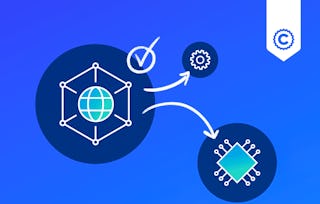The course "Advanced Methods in Machine Learning Applications" delves into sophisticated machine learning techniques, offering learners an in-depth understanding of ensemble learning, regression analysis, unsupervised learning, and reinforcement learning. The course emphasizes practical application, teaching students how to apply advanced techniques to solve complex problems and optimize model performance. Learners will explore methods like bagging, boosting, and stacking, as well as advanced regression approaches and clustering algorithms.

Advanced Methods in Machine Learning Applications

Advanced Methods in Machine Learning Applications
This course is part of Applied Machine Learning Specialization

Instructor: Erhan Guven
Included with
Recommended experience
What you'll learn
Understand and apply ensemble methods to improve model accuracy and robustness by combining multiple learning algorithms.
Explore advanced regression techniques for predicting continuous outcomes and modeling complex relationships in data.
Apply unsupervised learning algorithms for clustering, dimensionality reduction, and pattern recognition in unlabeled data.
Understand and implement reinforcement learning techniques and apriori analysis for decision-making and association rule mining.
Skills you'll gain
- Machine Learning
- Supervised Learning
- Regression Analysis
- Classification Algorithms
- Applied Machine Learning
- Machine Learning Algorithms
- Logistic Regression
- Unsupervised Learning
- Decision Tree Learning
- Random Forest Algorithm
- Reinforcement Learning
- Model Evaluation
- Data Mining
- Dimensionality Reduction
- Skills section collapsed. Showing 8 of 14 skills.
Details to know

Add to your LinkedIn profile
12 assignments
See how employees at top companies are mastering in-demand skills

Build your subject-matter expertise
- Learn new concepts from industry experts
- Gain a foundational understanding of a subject or tool
- Develop job-relevant skills with hands-on projects
- Earn a shareable career certificate

There are 5 modules in this course
This course provides a comprehensive exploration of advanced machine-learning techniques, including ensemble methods, regression analysis, and unsupervised learning algorithms. Students will gain hands-on experience with reinforcement learning and decision tree models while applying association rule mining on real datasets. Emphasis is placed on evaluating model performance and comparing various learning approaches. By the end, participants will be equipped with practical skills to tackle complex data-driven challenges.
What's included
2 readings
You can enhance supervised learning by using multiple weak classifiers that work on subsets of features with limited learning capability. By leveraging their sheer numbers and majority voting, ensemble classifiers consistently outperform and offer greater robustness than complex individual classifiers. Random Forest, considered one of the premier ensemble classifiers, relies on weak decision tree classifiers. Therefore, decision tree classifiers and their visualizations will be introduced in this module. Furthermore, you will see how employing numerous weak classifiers with reduced feature sets from the dataset can achieve combined voting performance that surpasses that of individual classifiers.
What's included
4 videos2 readings3 assignments1 ungraded lab
Certain problems you encounter will demand precise numerical predictions, such as forecasting the seasonal flu arrival rate or predicting next week's stock market index. For such scenarios, regression techniques prove invaluable. Throughout this module, you'll explore various types of regression, solve linear regression equations analytically, define cost functions, and understand situations where linear regression may falter. Additionally, you'll delve into coding quadratic and logistic regressions from scratch, utilizing polynomial features and sci-fi optimizers. Logistic regression, a widely used classification method, fits data to a logistic curve based on dataset features. You'll apply logistic regression to develop a predictive model for cancer recurrence using patient diagnostic data.
What's included
4 videos3 readings3 assignments1 ungraded lab
In this module, you will explore unsupervised learning, which serves as the counterpart to supervised learning. Unsupervised learning aims to construct the underlying probability distribution of a dataset based on its features as random variables, enabling it to identify outliers and centroids of densities. You'll begin by understanding distance and similarity metrics crucial for clustering algorithms. Popular algorithms like k-means, DBSCAN, hierarchical clustering, and EM will be introduced briefly. You'll also learn about metrics that evaluate cluster quality, alongside 3D visualizations and dendrograms. Using an artificial dataset similar to the one used in supervised learning, you will apply clustering techniques. Additionally, you'll witness clustering in action on the famous iris dataset, employing various algorithms. Throughout, you'll discover how the Elbow method aids in determining the optimal number of clusters.
What's included
4 videos2 readings3 assignments1 ungraded lab
In this module, you will explore reinforcement learning, completing the trio of major learning strategies alongside supervised and unsupervised methods. Similar to how humans learn to navigate their environments, reinforcement learning operates in scenarios where ground truth is absent or impractical, relying instead on interactions with the environment. You'll discover how guidelines are learned through rewards and penalties to maximize benefits or minimize costs. Reinforcement learning is widely applied in teaching computers to play complex board games like Backgammon or chess—AlphaGo's triumph over the Go world champion exemplifies its capabilities in AI advancement. You'll delve into the reinforcement model, terminology, and typical problems such as tic-tac-toe and elevator control. Techniques for developing a mathematical model like Q-learning, based on states and actions, will be explored, culminating in hands-on implementation to master a chosen game.
What's included
6 videos3 readings3 assignments1 programming assignment
Earn a career certificate
Add this credential to your LinkedIn profile, resume, or CV. Share it on social media and in your performance review.
Instructor

Offered by
Explore more from Machine Learning
 Status: Free Trial
Status: Free TrialFractal Analytics
 Status: Free Trial
Status: Free Trial Status: Free Trial
Status: Free TrialJohns Hopkins University
 Status: Free Trial
Status: Free Trial
Why people choose Coursera for their career

Felipe M.

Jennifer J.

Larry W.

Chaitanya A.

Open new doors with Coursera Plus
Unlimited access to 10,000+ world-class courses, hands-on projects, and job-ready certificate programs - all included in your subscription
Advance your career with an online degree
Earn a degree from world-class universities - 100% online
Join over 3,400 global companies that choose Coursera for Business
Upskill your employees to excel in the digital economy
Frequently asked questions
To access the course materials, assignments and to earn a Certificate, you will need to purchase the Certificate experience when you enroll in a course. You can try a Free Trial instead, or apply for Financial Aid. The course may offer 'Full Course, No Certificate' instead. This option lets you see all course materials, submit required assessments, and get a final grade. This also means that you will not be able to purchase a Certificate experience.
When you enroll in the course, you get access to all of the courses in the Specialization, and you earn a certificate when you complete the work. Your electronic Certificate will be added to your Accomplishments page - from there, you can print your Certificate or add it to your LinkedIn profile.
Yes. In select learning programs, you can apply for financial aid or a scholarship if you can’t afford the enrollment fee. If fin aid or scholarship is available for your learning program selection, you’ll find a link to apply on the description page.
More questions
Financial aid available,

